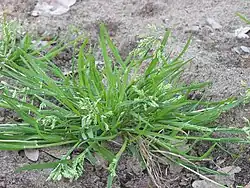Grass

Grass refers to a variety of low-lying plants. The three major families of grasslike plants are true grasses (Poaceae), sedges (Cyperaceae), and rushes (Juncaceae). Lawns and pasturelands are typically composed of true grasses, five of which cover 46% of the world's arable land: rice, wheat, maize, barley, and sugar cane.[1][2]
"Grass" as a name has been applied to a wide group of non-closely related plants including herbaceous plants whose leaves and stems are eaten by domesticated and wild animals. The word may have its origin in the Indo-European word "ghra-", meaning "to grow."[3]
Grass can refer to a green area, such as a lawn or a field, and is often used for recreation or for sports such as lawn tennis or bowls.[4] Beginning in the 1970s, some sports venues have installed artificial grass to reduce maintenance costs.
References
- ^ Kraehmer, Hansjoerg, ed. (2019). Grasses: Crops, Competitors, and Ornamentals. Wiley. p. 3. ISBN 978-1-119-41680-7.
- ^ Hipp, Andrew L. (2008). Field Guide to Wisconsin Sedges: An Introduction to the Genus Carex (Cyperaceae). Madinson, WI: The University of Wisconsin Press. p. 6. ISBN 978-0-299-22590-2.
- ^ Jr, James P. Smith (2014-09-12). Field Guide to Grasses of California. Univ of California Press. ISBN 978-0-520-95843-2.
- ^ "Cambridge Dictionary: Grass". Retrieved 12 July 2025.